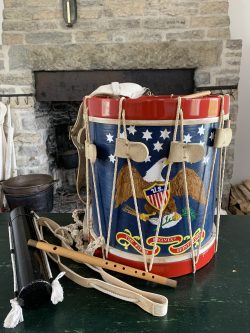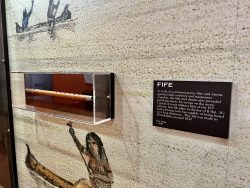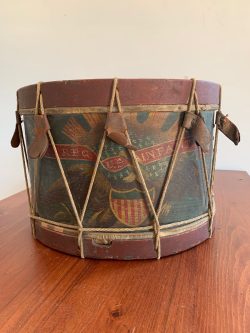Support the Fife & Drum Corps
Thanks to a generous donation from James Greisinger, in 2023 Heritage Hill established a Fife and Drum Corps. This crucial part of our living history program will perform daily interpretation, at special events, and in the community. We are still seeking donations for the Corps’ crucial and sustaining endowment.
Donate here!Learn more about the Fort Howard Guard Fife and Drum Corps, here.

Fifes & Drums
Fifes and drums were an indispensable part of the daily military experience during most of the 19th century. Military field music served as a routine communication system that ordered the soldiers’ day and conveyed critical signals during the din of battle. A fife and drum could easily be heard from hundreds of yards away. Fifes and Drums also functioned as regimental bands and provided morale-boosting musical accompaniment while on the march.
During the 1830s, each company had one fifer and one drummer. On average, drummers and fifers tended to be younger soldiers, but musicians of all ages were encountered
While in garrison and camp, fifes and drums provided the daily “duty calls” that regulated the soldiers’ routine. The day started with Reveille and a tune called “Three Camps” roused the troops out of their beds. Variously called “Roast Beef’ or “Peas on a Trencher” the signal for breakfast followed Reveille. In between breakfast and the noon meal, a number of drum signals served to direct the Officers and men. “Tattoo” signaled the end of the day.
During battle, or while drilling, the fifes and drums played a critical role in conveying everything from the rate of speed for marching to the firing of muskets. The shrill sound of the fifes combined with the resonant beat of the rope-tension drums filled the sounds of Fort Howard on a daily basis.

Reviving a Tradition
In 2023, the Heritage Hill State Historical Park resurrected the sounds of the fifes and drums at old Fort Howard with the establishment of a fife and drum corps. The fife and drum corps provides seasonal interpretation at Heritage Hill. This is defined as the period between May and November, with some special event performance outside this season. The frequency is flexible, but individual elements of the corps are be employed on a daily basis at the Fort. Large group performances are performed for special events. Uniforms and equipment, as well as the repertoire and practice methods painstakingly conform to period-correct standards.

The Music
The music repertoire consists of tunes that were commonly played during the 1830s, as well as the duty signals as outlined in the 1835 edition of The School of the Soldier. These were researched from primary sources and commonly available secondary sources such as the Company of Fifers and Drummers publications.
Music Instruction
In keeping with the goal of excellence, Heritage Hill employs instructors to build student technical efficiency and musical maturity, and to teach them the repertoire. Instruction is done in a group setting at Heritage Hill. Currently the Park has two levels – a senior corps and junior corps. The senior corps assists with instructing the junior members, where appropriate, and is the primary public expression of the Corps. Applicants for the junior corps may start instruction as young as 10 years old.
Your Support will ensure that we meet the mission of sharing the cultural and historical ties that bind our community together. Together, with your support, Heritage Hill State Historical Park offers a direct link to our shared history and cultural leanings. Make a gift now and help us advance the development of this important music preservation program. To learn more about sponsorships, contact Elizabeth Jolly-Haslitt at (920) 448-5150 ext.103 or email liz@heritagehillgb.org

